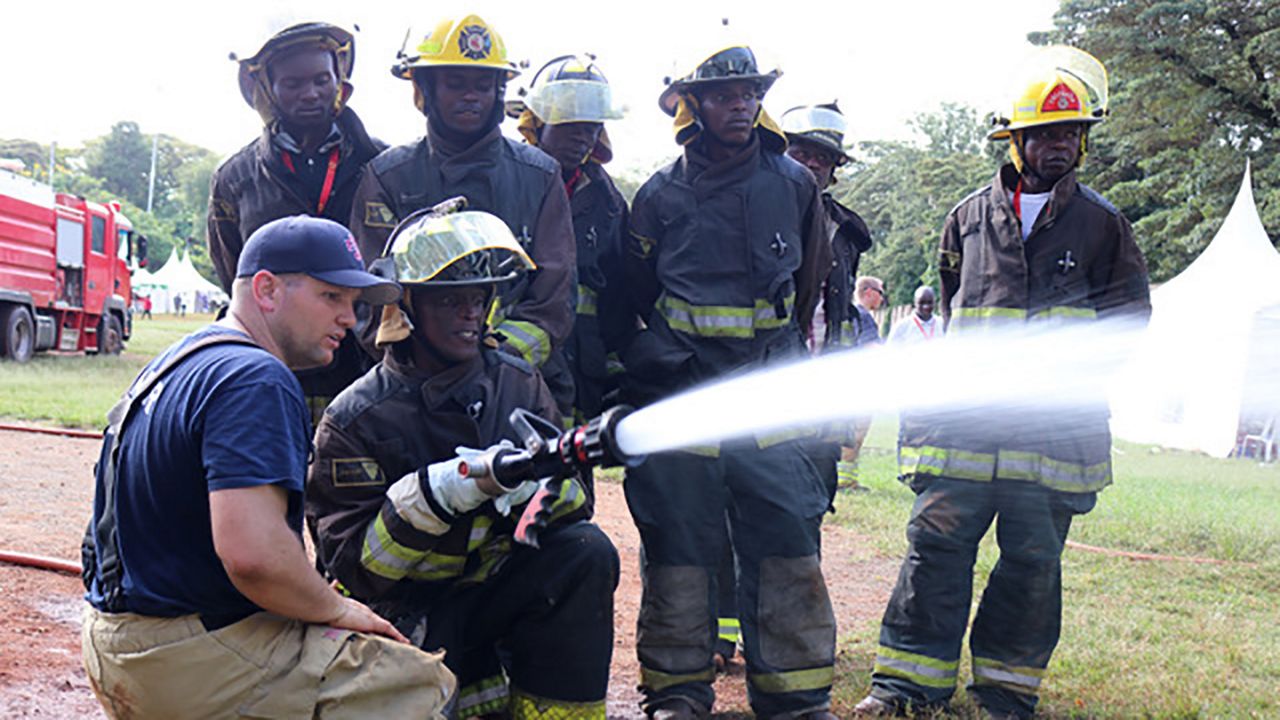CINCINNATI — When Nancy Moore and firefighters Matt Flagler and Craig Duck travel to Zomba, Malawi, later this month, it will be a major milestone for efforts to improve fire service in that underserved country.
The delegation represents Africa Fire Mission (AFM), a Cincinnati-based nonprofit that offers much-needed resources and training to fire departments in developing parts of Africa.
"We provide tools and equipment, teach tactics and skills, and help with fire prevention planning,” said co-founder David Moore, retired fire chief for Glendale, Ohio
What You Need To Know
- Africa Fire Mission is sending a delegation to Malawi in late June to train firefighters
- Group provides equipment, training and advocacy support
- Cincinnati-based AFM has worked in six countries in Africa to-date and looking to expand to Ukraine
- Group is largely made up of firefighters from across the country who volunteer their time
The need is great. Malawi, a country about the size of Pennsylvania, has only four fire stations and roughly 200 firefighters, according to AFM. Pennsylvania has more than 1,800 fire departments.
"We provide tools and equipment, teach tactics and skills, and help with fire prevention planning,” said co-founder David Moore, a retired firefighter, and former fire chief in Glendale, Ohio. Moore is not going on this two-week trip, but his wife, Nancy Moore, is.
Each member of this traveling party has visited the continent several times over the past eight years for similar projects. However, this will be AFM's first trip since mid-2020 due to travel restrictions related to COVID-19. The group has not been to Malawi since 2017.
The goal of this two-week trip is to establish a rapport with local officials and work with the fire departments to improve relationships with residents. Education is a major component of AFM's mission.
“We do a lot of community outreach. We teach the basics of fire prevention — things like how to call the fire department and principles of ‘Stop, Drop and Roll’ which are not always commonly known due to a lack of emphasis on fire prevention,” David said.
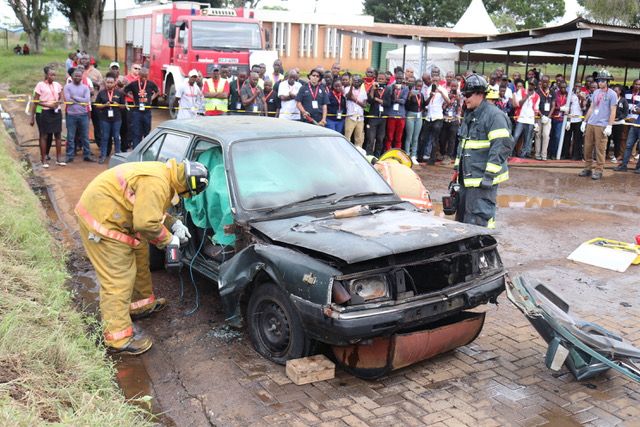
The Africa Fire Mission team consists of firefighters from Greater Cincinnati and around the United States. There are a few members from Boston, Orlando, Chicago and various other places across the country. Duck lives in Boydtown, Va.
Like Flagler and Duck, most of the team uses vacation time for these missions. They also pay their way or receive donations to cover travel expenses.
And they’re not going alone, at least not this time. They’re joining up with a team from Chicago that’s drilling fresh water pumps in Malawi.
“It’s an honor to be sort of a ‘first wave’ of folks who are re-establishing relationships and continuing programs impacted by COVID,” said Flagler, a district chief for the Cincinnati Fire Department.
About Malawi
Africa Fire Mission got the idea for a program in Malawi in 2017 after receiving a message from Namikango Mission, a Christian charity in the area. Those initial discussions with Malawian officials focused on evaluating community needs.
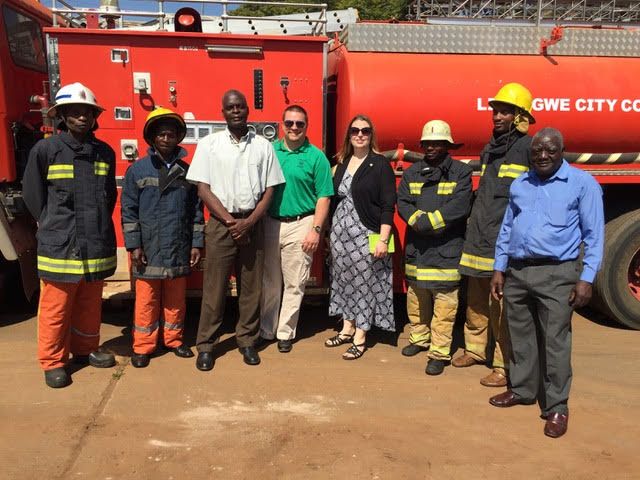
The Moores took a networking trip to Zomba, one of the country's biggest cities, shortly thereafter, to establish a local presence. Planning has been ongoing ever since. They had a return trip scheduled for last year, but then everything shut down due to the pandemic.
Nancy Moore, whose background is in social work, handles program development for AFM. She said the video chats were helpful to lay the foundation, but “you’re limited in what you can accomplish over a Zoom Meeting.”
Now, it’s time to meet face-to-face.
This trip to Malawi centers on relationship building. They’ll spend most of their time in Zomba and another major city, Lilongwe. They’ll meet representatives in a few smaller, more rural communities as well.
On a normal trip AFM would send a 40-foot shipping container full of tools, personal protective equipment and training materials. They won’t send quite as much this time, but the AFM team “never goes anywhere empty-handed,” Nancy said.
They're bringing enough helmets, fireproof jackets, pants, gloves and boots to outfit the roughly 30 members of one of Malawi’s fire stations. They'll ship and bring more equipment on future trips.
Donations or grants cover the costs of the equipment and shipping it overseas.
Historically, AFM has not donated bigger items like fire engines or ladder trucks. Beyond the expense of those items, David said those types of donations usually don’t work out well. That's because the equipment isn’t likely designed for how it will be used in Africa.
David described a "fire truck graveyard" full of donated equipment that either was too old or intended for a different type of terrain.
The Africa Fire Mission team helps with the purchasing and procurement processes for things like fire trucks, though. That includes identifying vehicles and working with vendors to design job-specific equipment.
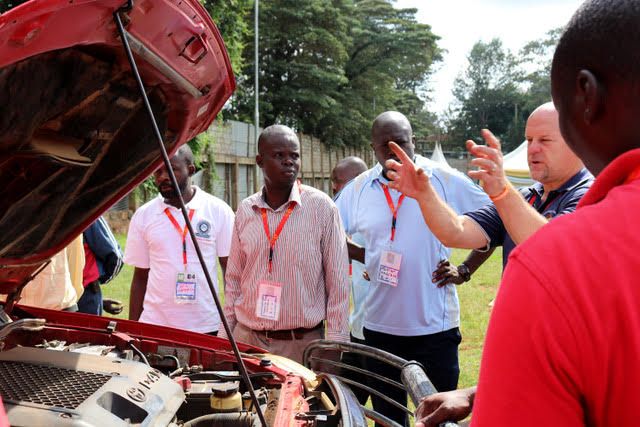
They also teach local fire officials how to advocate to their governments for what they need. David said, in general, funds are available, but the priority and awareness aren’t necessarily there.
Since 2013, Africa Fire Mission has worked with fire departments in six countries — Ethiopia, Kenya, Malawi, Sierra Leone, Zambia and, most recently, Ghana. They’ve even made preliminary trips to Ukraine and are looking at possible expansion to Europe or other locations around the world.
David is disappointed he won’t be traveling on this trip to Malawi. But he has made 19 mission trips over the years and knows there will be other trips down the road.
“I’m sad, but we know there’s a lot of work to do for fire service in Africa and throughout the rest of the developing world,” he said. “We have big plans for the future and look forward to helping out as many people as we can.”
How we got 'here'
In 2007, Glendale, a small village near Cincinnati, selected David Moore to be its fire chief. He was 31.
At that point, David Moore assumed he would one day be the chief of a major metropolitan fire department. Maybe Detroit or Washington, D.C.
But his job wasn’t everything to him; he had other passions that mattered just as much — family, his faith, serving others.
It was his faith that led Moore to embark on what proved to be a life-changing trip to Nairobi, Kenya in 2012. The Moores were there as part of a church mission trip through their church – Lifespring Christian Church in North College Hill.
David Moore said he wouldn't have gone if his wife didn't make him.
"We were asked to go on a mission trip for our church. I really didn't want to go and I was kind of upset about it, but my wife kept asking," he recalled. "Finally, I gave in — and it was one of the best decisions I ever made."
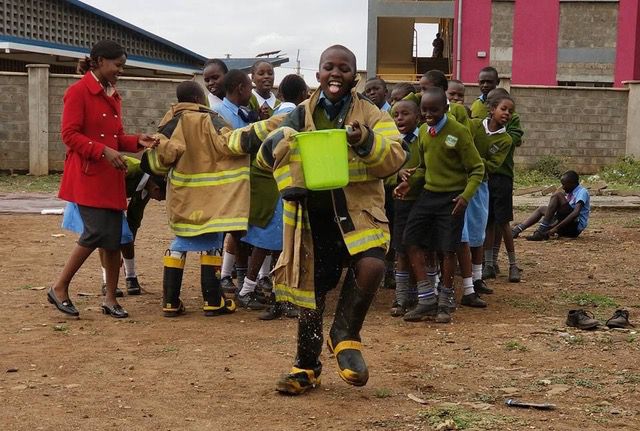
The Moores worked with Mission of Hope International (MOHI) during that trip. Nancy Moore trained local social workers on how to prevent and address cases of child sexual abuse.
When they found out David Moore was a firefighter, they asked him to provide fire safety training to teachers at schools in the Mathare Valley.
That led to a conversation with Nairobi’s top fire official, Chief Brian Kisali. What David Moore said he remembers most about that chat was learning how little the fire departments in Nairobi had to work with.
According to David Moore, Chief Kisali told him there were only 156 firefighters to protect a city of more than 4 million people. They had only three fire stations. Combined, the stations had two working fire engines, one ladder truck and a few other pieces of apparatus. There was also a lack of proper tools and protective equipment, David Moore said.
Years later, Africa Fire Mission has played a role in transforming fire service in Kenya, and several other parts of the continent.
David says there are now 1,000 firefighters in Kenya and more on the way.
Below is a partial statement from Chief Fire Officer Wako Abgudo Kosh, Isiolo County, Kenya, provided by Africa Fire mission:
“For so many years, poor African communities and businessmen lost their lives and livelihood to fire and rescue efforts and were forced to rely on handouts from well-wishers. Firefighters too, due to lack of skills and equipment, were staring at a bleak future when Africa Fire Mission stepped in. … Africa Fire Mission is offering unmeasurable, sustainable capacity development.”
Kosh’s statement goes on to call AFM’s work “exemplary and worthy of emulating." He said the work they are doing will save “countless lives” and “hard-earned properties” in the years to come.
Those results wouldn't have happened if David Moore didn't make a drastic decision following that first trip to Kenya. He decided to retire as fire chief in Glendale, at 36 years old, to start Africa Fire Mission.
No one was more surprised than his wife.
“My first thoughts were, ‘Are you joking? I had to twist your arm to get you to go with me to Africa in the first place,'” Nancy Moore recalled.
For the first two or three years following the launch of Africa Fire Mission, The Moores didn’t take a paycheck. The couple lived off savings and Nancy’s salary as a social worker.
While she may still bust her husband's chops from time to time, Nancy Moore knows they made the right choice. It’s what they’ve trained for, even studied in school. She studied social work at the University of Kentucky and David has a master's in public administration from Northern Kentucky University.
“Both of us were really in line with it,” she said. “I remember thinking, ‘OK, we’re really doing this!' This is what we’re supposed to be doing."
Now, David Moore receives a salary for his work with AFM and Nancy Moore splits her time between the nonprofit and her social work business. But who's signing their paycheck doesn't seem to matter that much to the Moores.
“It was never about the money or a job, per se,” David Moore said. “It really feels like a calling to be doing this type of work and serving people truly around the world."
You can find out more about Africa Fire Mission at https://www.africafiremission.org.



